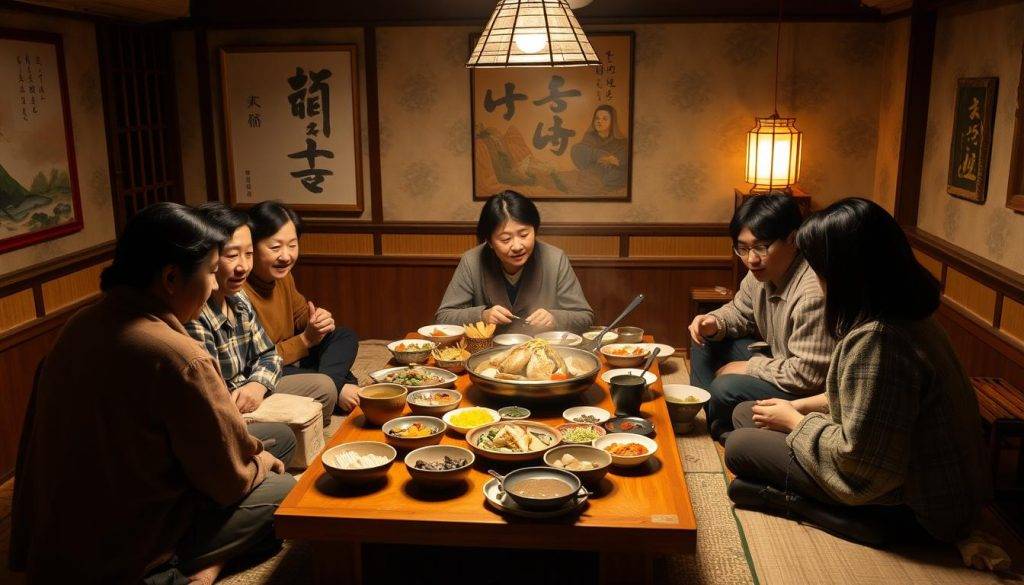“We are wired for connection – it’s what gives purpose and meaning to our lives,” Brené Brown once observed. This truth finds profound expression in jeong, a Korean cultural concept that redefines how humans build unbreakable bonds through shared responsibility.
Unlike transactional relationships common in individualistic societies, this sentiment thrives on collective care. It’s the invisible thread weaving communities together – neighbors who become family, coworkers who transform into lifelong allies. Here, empathy isn’t optional; it’s the currency of human interaction.
What makes this concept revolutionary? It challenges the “me-first” mindset dominating modern life. Through shared vulnerability and mutual support, people create networks stronger than blood ties. These connections weather crises, celebrate triumphs, and nurture growth – a blueprint for rebuilding fractured communities worldwide.
Key Takeaways
- A cornerstone of Korean culture fostering deep, non-transactional relationships
- Prioritizes community well-being over individual gain
- Offers strategies for building emotional resilience through interdependence
- Contrasts with Western individualism while complementing global needs
- Provides actionable frameworks for workplace and personal connections
Understanding the Essence of Jeong
Cultural frameworks shape how societies nurture human bonds—and few concepts challenge Western individualism as profoundly as Korea’s approach to connection. This cultural blueprint thrives on mutual care rather than transactional exchanges, creating networks where responsibility becomes a shared language.

Defining Jeong in Korean Society
Imagine a grandmother insisting you eat third helpings despite protests—this warmth captures the spirit of jeong. More than affection, it’s an unspoken pact to prioritize others’ needs. Communities become extended families, with neighbors checking in and coworkers sharing life burdens.
This cultural framework flips self-reliance narratives. People see personal growth as tied to collective well-being. Emotional walls soften, replaced by organic support systems that catch individuals during hardships.
Contrasting Eastern Collectivism and Western Individualism
Western cultures often celebrate personal boundaries. In Korea, shared vulnerability strengthens ties. A coworker might ask about your family’s health—not small talk, but genuine investment in your world.
Consider these differences:
- Individualistic societies: Independence as success
- Collectivist cultures: Interdependence as strength
This doesn’t mean one system outshines the other. But understanding both helps you expand your relational toolkit. The Korean way demonstrates how attachment to community can fuel resilience, offering strategies for workplaces and neighborhoods seeking deeper cohesion.
Cultural Expressions: Food, Family, and Community
Imagine walking into a room where every dish tells a story of belonging. In Korea, shared meals and maternal care form living classrooms for human connection. These traditions reveal how simple acts of warmth can rewrite social rules.

Warm Gestures and the Hasukjib Experience
A Chinese student once moved into a Seoul hasukjib—a dormitory run by an older woman. The owner asked about their family and birthday on day one. Months later, seaweed soup and cake appeared for the student’s birthday—a meal Korean mothers traditionally prepare.
This experience shows how curiosity becomes care. Personal questions weren’t intrusive—they laid groundwork for lasting bonds. Strangers became chosen family through shared stories at the table.
Shared Meals as a Celebration of Connection
Korean dining tables overflow with communal dishes. Meals designed for sharing create natural collaboration. Phones stay pocketed—conversation and eye contact take priority.
The term “our mother” replaces “my mother” in daily speech. This linguistic shift reflects how family expands beyond blood ties. Nourishment becomes a group responsibility, with everyone ensuring others eat well.
| Aspect | Individualistic Dining | Collectivist Dining |
|---|---|---|
| Meal Size | Single portions | Family-style platters |
| Focus | Convenience | Conversation |
| Technology Use | Phones allowed | Devices discouraged |
| Relationship Building | Optional | Essential |
These practices offer blueprints for meaningful connection. Whether hosting dinners or checking on neighbors, small investments in others’ well-being create resilient networks. The warmth of shared food and open questions proves transformative—one meal at a time.
Exploring Jeong: The Heart of Korean Connection
Human bonds often form in unexpected ways—through a shared scarf at a soccer match or a grandmother’s persistent offer of homemade kimchi. These moments reveal how connection thrives when people prioritize collective joy over individual comfort.

Personal Narratives of Resilience and Kindness
A Sri Lankan traveler once described Korean bus drivers announcing stops like concerned uncles: “Hold tight—curves ahead!” This daily warmth reflects a cultural ethos where strangers become temporary guardians. Elderly shopkeepers often walk lost tourists to destinations, using gestures when words fail.
These acts create resilient bonds that outlast single interactions. One Japanese student received handwritten recipes from a market vendor—a year later, they still exchange holiday notes. Such stories prove affection needs no perfect language.
Fan Culture and the Spirit of Togetherness
At FC Seoul games, fans trade scarves like family heirlooms. Strangers chant in unison, their voices merging into a single roar. K-pop enthusiasts worldwide bond over lyric translations, forming friendships that span continents.
- Night markets become stages for impromptu dance collaborations
- Fan meet-ups transform subway stations into celebration hubs
- Shared merch creates instant camaraderie among strangers
Global Impressions and Lasting Impact
Visitors often leave Korea with reshaped definitions of love. A Brazilian artist recalled a snowy night when three separate locals offered directions—and hot tea. These experiences linger for years, inspiring people to replicate such connection in their communities.
As one Australian teacher noted: “I now check on neighbors during heatwaves—it’s my small way of keeping that spirit alive.” This global ripple effect proves kindness needs no passport.
Conclusion
In a world where digital connections often replace real bonds, Korean culture offers timeless strategies for human thriving. The concept of jeong stands as a vital piece of social wisdom—a blueprint for transforming daily interactions into bridges of mutual care.
This cultural approach reshapes how we view responsibility. Shared meals become trust-building exercises. Checking on neighbors turns into community glue. Through small, consistent acts of kindness, strangers evolve into chosen family.
What makes this framework revolutionary? It works across languages and borders. A Brazilian traveler remembers Seoul’s tea-offering strangers years later. An Australian teacher adopts check-in habits learned abroad. These ripples prove connection needs no perfect words—just open hearts.
As individualism fractures modern life, this piece of cultural insight grows more crucial. Professionals use its principles to build supportive teams. Families create deeper bonds through intentional listening. The magic lies in daily practice: choosing collective well-being over personal convenience.
Korean culture’s global influence shows our universal hunger for authentic bonds. By embracing this mindset, anyone can spark change—one kind gesture at a time.
FAQ
How does Korean collectivism differ from Western individualism?
Korean collectivism emphasizes group harmony and mutual care—seen in shared meals and community support systems—while Western individualism often prioritizes personal goals and self-reliance. This cultural contrast shapes how people build relationships and navigate challenges.
What role does food play in expressing connection?
Shared meals act as social glue in Korean culture, fostering trust and belonging. Practices like hasukjib (boarding houses) highlight how cooking and eating together create bonds that transcend mere nourishment, reflecting deeper values of generosity and reciprocity.
Can non-Koreans experience this type of emotional bond?
Absolutely. While rooted in Korean traditions, the warmth and loyalty associated with these connections resonate universally. Many foreigners report feeling embraced through gestures like home-cooked meals or collaborative problem-solving in workplaces and neighborhoods.
How does resilience manifest in everyday Korean life?
Resilience appears through small, consistent acts—neighbors helping during hardships, families supporting education sacrifices, or fan communities rallying around shared goals. These patterns reveal how collective effort strengthens both individuals and groups over time.
Why do global audiences find these cultural concepts compelling?
In an increasingly disconnected world, the emphasis on lasting bonds and mutual care offers a counterbalance to transactional relationships. Stories of perseverance and kindness inspire those seeking more meaningful ways to connect personally and professionally.
How does fan culture reflect communal values?
Fan communities often mirror family-like support systems, organizing charity projects or collective celebrations. This collaborative spirit—whether cheering for artists or athletes—showcases how shared passions can unite strangers into cohesive, purpose-driven groups.




























































